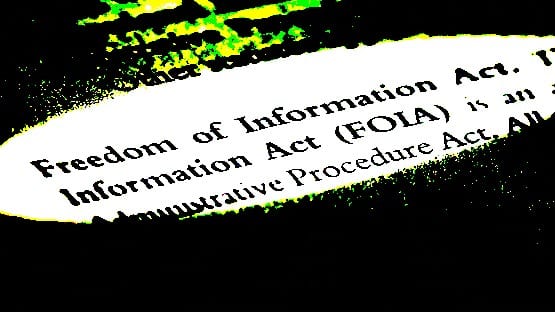
The Augusta County Board of Supervisors voted, yes, of course, they did, it was a 6-1 vote, on Wednesday night to spend more county taxpayer dollars to continue to try to keep what was said in an illegally held closed meeting last year from being made public.
Among the members of the Board of Supervisors to vote in favor of funding the expensive appeal:
- Butch Wells, who tried to intimidate me in a Dec. 22 phone call into revealing a potential source of information on the identity of one of two women whose claims of sexual harassment against Steven Morelli reportedly led to his March 20 resignation from the BOS.
- Jeffrey Slaven, the board’s chair, and Gerald Garber, who are, together, being investigated by a special prosecutor in an unrelated matter involving an allegation from a state employee that they tried to get her fired from her job because she spoke out on a county policy issue last summer.
Local government in Augusta County is a mess, but to hear the Augusta County 6 tell it, the bad guys in this are the local media outlets, including AFP, that are trying to get to the bottom of what’s going on.
“I can tell you how I’d sell it to my district. This is how this started, and this is what this kind of crap is costing you. That’s how I’ll sell it,” Garber said, in response to a question on the cost of the litigation from Scott Seaton.
Seaton was the lone supervisor to vote Wednesday against appealing the Augusta County Circuit Court decisions in two cases brought to get access to copies of a recording made by Seaton of a March 20, 2023, closed session of the BOS in which the resignation of Morelli was discussed.
In the first of the two separate Jan. 11 decisions in the Virginia Freedom of Information Act cases, brought by AFP and Breaking Through Media, Judge Thomas J. Wilson IV ruled that the recordings, “having been turned over to the County, are now County public records and no longer the private property of Dr. Seaton.”
Wilson, on this point, was overruling an earlier finding from Judge Rupen R. Shah, who in an Oct. 12 decision in the AFP case, which was heard in Augusta County General District Court, had declared that the recordings were not subject to FOIA because they were made by Seaton “for simply self-serving purpose,” and that they were “not a record of the agency nor is kept in a normal course of its business.”
That the recordings had been turned over to the county by Seaton was the result of what is beginning more and more to look like an attempted coverup on the part of county officials, who have been laser-focused on keeping whatever was said behind closed doors in that March 20 meeting from being made public.
The break in the case for the two plaintiffs was the move by the Board of Supervisors, at an Aug. 2 special meeting, to pass a resolution requesting possession of the recordings made by Seaton; Seaton complied a week later, turning over copies of the digital recordings, but maintaining control and custody of the originals for himself.
Those two acts were the foundation to Wilson’s declaration that the recordings are now public records, and thus FOIA-able.
With that as a foundation, Wilson sided, in the Breaking Through Media case, with the contention brought by the plaintiff’s counsel, Amina Matheny-Willard, that the county had illegally gone into closed session to discuss the Morelli resignation.
On this point, Matheny-Willard cited a 2020 Virginia Supreme Court decision, styled Cole v. Smyth County Board of Supervisors, in which the high court had sided with the petitioner, Cole, in a case involving a closed meeting of that board of supervisors held to discuss the possible closing of the county library system.
In that 2020 Virginia Supreme Court ruling, the court, in an opinion written by Chief Justice S. Bernard Goodwyn, observed that the relevant state code section, 2.2-3712(A), states that a “general reference to … the subject matter of the closed meeting shall not be sufficient,” and that “this prohibition against ‘general reference[s]’ is an implicit requirement that a motion effectively identify the subject matter to be discussed in the closed session. The Motions’ broad mention of ‘actual or probable litigation’ does not do so.”
The motion read and adopted by the Augusta County Board of Supervisors to go into closed session at its March 20 meeting was of the “general reference” variety, as County Administrator Tim Fitzgerald attested to in court testimony at a Dec. 21 hearing.
“(F)or the personnel exemption for the closed session, the County simply listed one of the subject matters as ‘Board of Supervisors.’ That statement is too cryptic, is merely a general reference to the subject matter, and does not contain the particularity I believe the statute requires,” Wilson wrote in his ruling in the Breaking Through Media case.
It would be a surprise to see the Virginia Supreme Court move to overturn a legal precedent established in a case decided just four years ago, so for all intents and purposes, the move by the Board of Supervisors to seek an appeal comes across as a grab at trying to extend the game a little longer, akin to a basketball coach ordering his players to foul the other team to hope for misses at the free-throw line.
What’s different here is that there’s an actual dollar cost to the strategy that the county is pursuing, an issue that the BOS sidestepped entirely ahead of its vote on Wednesday.
Seaton, the only member of the Board of Supervisors to show any interest in the bottom-line cost of the litigation, did get County Attorney James Benkahla to concede that the county, and thus county taxpayers, are on the hook for the costs associated with the outside counsel, Rosalie Pemberton Fessier, who was hired to try the cases.
According to Benkahla, a state liability insurance carrier will assume the costs for one of the cases, presumably the AFP case, based on the rest of his answer to a question on that topic – “not the one that we’re asking to appeal now.”
Benkahla said the charge to the county for the defense is $250 an hour, and that he couldn’t answer a question as to what the county has already run up in terms of legal bills to this point.
“I don’t have a total. I can’t answer that,” Benkahla said.
The county would also be on the hook to reimburse the plaintiffs in the case for attorneys’ fees in the event that the Supreme Court would, as expected, uphold the circuit court decision.
Before supervisors cast their votes, Seaton extracted a pound of flesh from the Augusta County 6 for bungling themselves and the county into the situation that we’re all in now.
“You requested my notes, despite the law covering FOIA, and I delivered these recordings. If you didn’t request, I wouldn’t have delivered them, and we wouldn’t be in this situation,” Seaton said. “Once you did that, in the judge’s opinion, the recordings became county property and subject to FOIA. I think there’s been a lot of missteps, but recording my notes was not one of them. We have quite a few meetings that were not motioned properly. And I think this, if we motion to appeal this, we’re setting up the taxpayers for quite an expense for something that they already own.”










